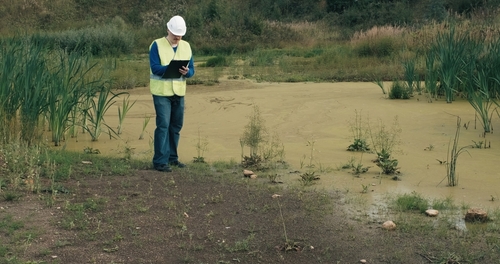
When you make the major decision to earn a college degree in physical and biological sciences, you open up a wide range of career opportunities. Some of these can be as lucrative as they are intellectually stimulating. One of the top paying careers for physical and biological science majors is petroleum geologist. These professionals search for oil and gas deposits in the Earth. With experience, they can earn a median annual salary of $117,000. To begin your path to a new career as a petroleum geologist, you must first pursue an undergraduate education from a college or university.
Skills for Success as a Petroleum Geologist
To be successful at their work, petroleum geologists need several important skills. They don’t blindly begin choosing locations to dig for oil. Instead they must learn how to collect, understand and analyze geological information so that they can determine the most likely sites of oil deposits, the United States Bureau of Labor Statistics (BLS) reported. Petroleum geologists harvest rock samples and examine them to learn whether or not oil is present in the suspected site. Using their geoscience knowledge and their mathematics skills, they assess how much oil is likely to exist in a given site.
A Petroleum Geologist’s Education
How do petroleum geologists learn all of these skills and more? Their educational path starts in a classroom. During the course of their college careers, aspiring petroleum geologists develop skills in the laboratory and during field work. A bachelor’s degree will prepare candidates for many entry-level positions. However, you should know that advancement into higher-level positions or more prestigious organizations may require you to earn a master’s or even a doctorate degree.
Many employers in this field consider the best degree path to becoming any type of geoscientist is a bachelor’s degree in geosciences, the BLS reported. In these programs, students will study important areas of geology such as:
- structural geology
- mineralogy
- petrology
Students who don’t have the option of majoring in geosciences at their desired school don’t have to give up their professional goals. It’s possible to prepare for a career as a geologist by majoring in a program such as:
- biology
- physics
- chemistry
- engineering
- computer science
- mathematics
In fact, even students majoring in geoscience have to take coursework in these disciplines. For an aspiring petroleum geologist who chooses to major in something other than geosciences, taking geology courses is essential.
While the career requires a challenging path of educational study, there are plenty of things to like about being a petroleum geologist. CNN Money ranked the occupation number six on its list of the 100 “Best Jobs in America.” It noted its impressive median and top salaries and an anticipated job growth of more than 20 percent over just 10 years. Petroleum geologists can also lead a life of adventure, traveling a good deal for work and spending much of their time in the field.
Related Resources:
